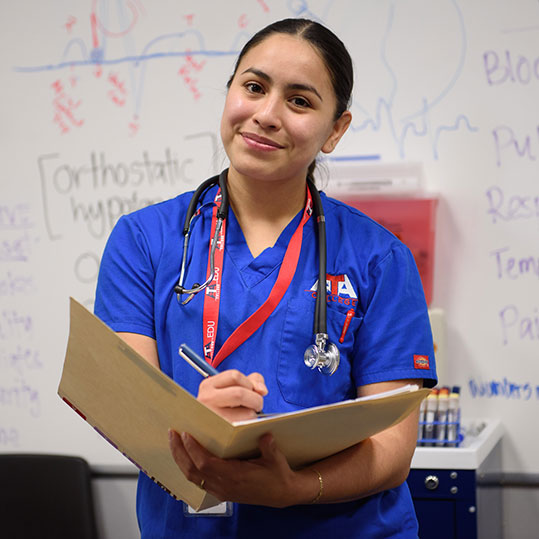Are you interested in working with patients but do not want to spend 2 to 4 years in college? If so, then consider becoming a medical assistant. Medical assistants help nurses and physicians by providing supportive care to patients. They perform a variety of tasks that include administrative duties and patient care. Choose whether you would like to work in a fast-paced setting or something more relaxed, like a local practice or small clinic. To become a certified medical assistant, you can start your career at an accredited trade school.
How Long Does It Take to Become a Medical Assistant?
Our medical assistant training program can be completed in as little as 8-month, attending full-time. This coursework is designed to prepare you with the skills to perform administrative and clinical tasks in a medical office. You will learn the skills necessary to provide support directly to patients and manage back-office work that keeps medical facilities running smoothly.
If you enjoy your training and want to further your education and credentials, our medical assistant diploma can be transferred to the associate of science medical assistant program. With an additional 6 months of study, the associate’s program will prepare you with both general education courses and advanced medical assisting studies in electrocardiography and phlebotomy. Upon graduating from the associate’s program, you will be awarded an Associate of Science in Medical Assisting.
What Do You Learn in a Medical Assisting Program?
The core subjects in the program are anatomy, physiology, medical terminology, and pharmacology. These are the fundamental subjects you need to understand how the human body works and perform basic clinical tasks. You will also study medical coding, medical office administration, and lab and clinical procedure to work well with a team of healthcare professionals. Your job will include a combination of assisting with patient care and performing a variety of administrative tasks.
Students will learn:
- Medical Terminology
- Healthcare Writing
- Medical Coding and Billing
- Pathology and Physiology
- Introductory Pharmacology
- Administrative Procedures in Healthcare Settings
- Clinical Support Procedures for Hospital and Office Settings
While you can do some basic clinical tasks, like administering vaccinations and drawing blood, the physicians’ will conduct the examinations, treatments, or medication administration.
What Skills Do Medical Assistants Learn During a Vocational School Program?
There are many skills that a medical assistant learns during a vocational school program; communication and attention to detail to teamwork and beyond. Mastering these skills will help you succeed while working in a physician’s office.
Skill #1: Communication
Medical assistants need to communicate well, both verbally and in writing. Much of what a medical assistant does is talk with patients in person and over the phone. They also manage patient charts and write reports for physicians to review.
Part of good communication is active listening. Taking the time to hear what patients and coworkers say before responding will show that the medical assistant listens and wants to help. Trust must be built up between a medical assistant and patient, and with good communication, that bond can be forged.
Body language is also an essential communication tool, both how the medical assistant projects and how the patient reacts. For example, crossed arms can be a defensive posture, poor eye contact can be a sign of disinterest, and pointing can be offensive to some. Using proper body language and decoding a patient’s body language will speak volumes and help the medical assistant better help a patient understand what they say and what they may mean.
Skill #2: Attention to Detail
A medical assistant manages real patient information, vital signs, and medical histories. It is important for them to pay close attention to the specifics as even a small error can have dire consequences. For example, an incorrect medical code or forgetting to add an allergy may impair the physician’s decisions, causing unnecessary harm to a patient.
Skill #3: Time Management
A medical assistant only has so many hours in the day. A medical assistant that has good time management skills will know how to prioritize. Whether it is doing phone triage or making sure patients aren’t waiting too long for their appointment, a medical assistant needs to manage their time properly.
Skill #4: Problem Solving
Any workplace will have problems, whether an emergency patient or the practice runs out of supplies. It is up to the medical assistant to identify the problem and find the best solution for everyone involved. They can also work as a team to solve more complex issues.
Skill #5: Teamwork
The medical assistant is the backbone of the physician’s office. They are the liaison between the patient and the physician. The medical assistant is usually the first person a patient sees and the last person a patient sees when leaving. That means a medical assistant must work together with the medical office staff and physician to offer the proper care to the patient. In addition, the medical assistant must work well on the medical office’s team, keeping everyone up to date on the patient’s vital information. Without every cog in the machine working properly, the machine will fall apart.
What Does a Medical Assistant Do at a Physician’s Office?
Medical assistants in a physician’s office perform tasks assigned to them by supervising medical personnel. They work directly for doctors and nurses and may report to an office supervisor as well. Assisting these professionals each day is the core of a medical assistant’s responsibilities; they may work at the front desk, greet patients, schedule appointments, respond to emails and phone calls, or manage electronic data according to HIPPA.
On the clinical side, medical assistants can measure vital signs and enter information into a computer for easy access by the doctor. They may also take a patient’s weight and ask them preliminary questions about their medical history or about any medications they’re taking. At times, medical assistants stay in the room while physician attends to patients. For example, they might give the physician supplies they request or administer an injection or medication directed by the physician or a registered nurse. Again, the medical assistant is the backbone of the physician’s office.
Final Thoughts
If you think being a medical assistant could be your calling, contact us today. Do you have 8-months to start a new career? Becoming a medical assistant is both challenging and rewarding and can offer a life-long journey. So, take the first step toward a new career and learn more about ATA College today.
Medical Assistant Diploma
The Medical Assistant program is designed to teach you the administrative and clinical skills necessary to work in both back and front office settings of a doctor’s office or similar setting.
After completing the diploma program at this El Cajon | San Diego Medical Assistant School, you have the option to continue in the Medical Assistant, Associate of Applied Science program. The associate degree can be completed in an additional six months and contains general education courses, along with advanced medical assisting courses and classes in electrocardiography and phlebotomy.
Contact us today to learn more about medical assisting career opportunities offered at ATA College.





